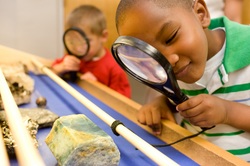
Obtaining kids interested in science at an early age is pretty essential.
It is less complicated than you believe.
Science doesn't need to be one thing mysterious.
It truly is happening all around us, and you may use everyday points to encourage your children's interest and knowledge.
Most parents think that they can't support their children with science.
But you do not require a advanced scientific degree to teach young young children science.
All you'll need is really a willingness to attempt to observe the globe, and to take the time to encourage their natural curiosity.
You may assist by having a positive attitude toward science yourself.
Then start off simply by asking your child questions concerning the items you see each day.
Why do you think that happened?
How do you feel that works?
After which listen to their answer without having judging it or judging them.
Listening without judging will improve their confidence and allow you to ascertain just what your child does or does not know.
You may turn each day activities into science projects.
By way of example don't just comment on how bright the moon is one night.
Ask questions about why it is brighter tonight why does it alter shape, and so on.
It is possible to observe the moon's phases all through a month and turn that activity into a science project with out even mentioning the words "science project".
For a child that likes cooking observe how milk curdles after you add vinegar or how sugar melts into syrup.
Attempt baking a cake and asking why does the cake rise?
What happens if you forget to put in some ingredient?
Voila! Instant science project notion with out being intimidating to you or your child.
Diverse children have unique interests so they have to have diverse sorts of science projects.
A rock collection may possibly interest your young daughter but your older son may require some thing a lot more involved.
Fortunately it's not challenging to find a lot of fun projects.
Understanding your child is the very best approach to obtain enjoyable understanding activities.
Here are some much more guidelines:
- Pick out activities which are the proper level of difficulty - not too easy nor too challenging.
If you are not certain pick one thing less difficult given that you don't desire to discourage a child by making science frustrating.
You may normally do the harder project later on.
- Study the suggested ages on any projects books or toys labels but then make sure that the activity is proper for your child regardless of age.
Your child's interest and abilities are unique.
If a child considering a topic they may well be able to do activities generally accomplished by older youngsters even though a child who is not interested may well need to have one thing less complicated aimed at a younger ages.
- Look at how properly the kind of project matches your child's personality and studying style.
Will be the project meant to be accomplished alone or in a group?
Will it demand adult assist or supervision?
- Decide on activities matched to your environment.
A city full of bright lights at night may possibly not be the most beneficial location to study the stars.
But during your vacation to a remote location, you might be able to spark an interest in astronomy.
- Let your child help choose the project or activity. It's effortless enough to ask. Rather than overwhelm them, suggest two or three possibilities. When a child picks something they're thinking about, they are going to get pleasure from it and discover a lot more from it.
Go ahead. Attempt it and see for yourself how straightforward it's the spark the interest of a child.
 RSS Feed
RSS Feed